11-12学年英语:Module 3 同步教案(外研版九年级上)
- 格式:doc
- 大小:107.50 KB
- 文档页数:16
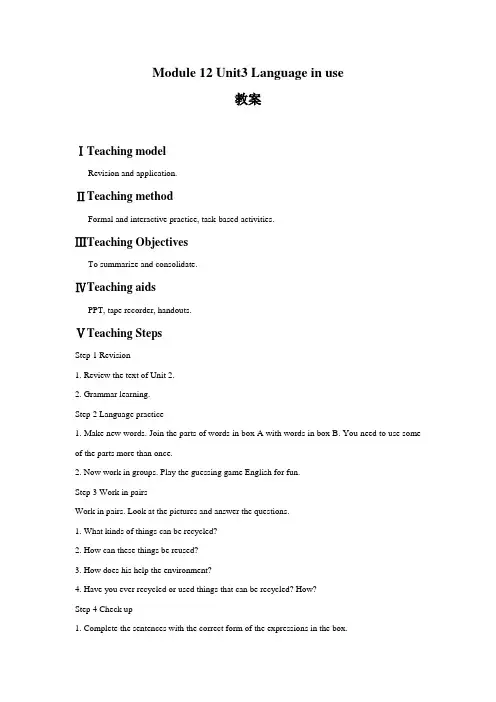
Module 12 Unit3 Language in use教案ⅠTeaching modelRevision and application.ⅡTeaching methodFormal and interactive practice, task-based activities.ⅢTeaching ObjectivesTo summarize and consolidate.ⅣTeaching aidsPPT, tape recorder, handouts.ⅤTeaching StepsStep 1 Revision1. Review the text of Unit2.2. Grammar learning.Step 2 Language practice1. Make new words. Join the parts of words in box A with words in box B. You need to use some of the parts more than once.2. Now work in groups. Play the guessing game English for fun.Step 3 Work in pairsWork in pairs. Look at the pictures and answer the questions.1. What kinds of things can be recycled?2. How can these things be reused?3. How does his help the environment?4. Have you ever recycled or used things that can be recycled? How?Step 4 Check up1. Complete the sentences with the correct form of the expressions in the box.2. Listen and check the true sentences.3. Listen again and complete the table.Step 5 Module task1. Work in groups. Decide what kind of pollution you want to talk about.2. Discuss you subject. Take turns to say what you think about the problem and what can be done.3. Present your group’s ideas to the whole class.Step 6 HomeworkFinish the exercises in the workbook.。
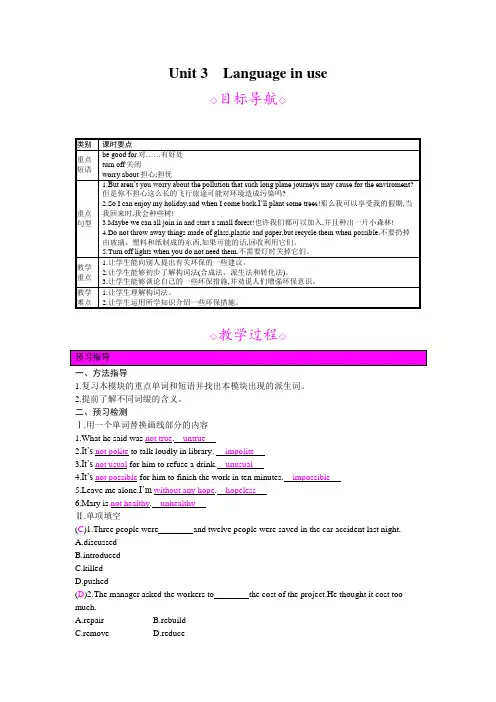
Unit 3Language in use◇目标导航◇◇教学过程◇一、方法指导1.复习本模块的重点单词和短语并找出本模块出现的派生词。
2.提前了解不同词缀的含义。
二、预习检测Ⅰ.用一个单词替换画线部分的内容1.What he said was not true.untrue2.It’s not polite to talk loudly in library. impolite3.It’s not usual for him to refuse a drink.unusual4.It’s not possible for him to finish the work in ten minutes.impossible5.Leave me alone.I’m without any hope.hopeless6.Mary is not healthy.unhealthyⅡ.单项填空(C)1.Three people were and twelve people were saved in the car accident last night.A.discussedB.introducedC.killedD.pushed(D)2.The manager asked the workers to the cost of the project.He thought it cost too much.A.repairB.rebuildC.removeD.reduce(B)3.David felt because he failed the exam.He wanted to give up.A.hopefulB.hopelessC.helpfulD.helpless(C)4.May I Mr Smith’s address?I have some books to send to him.A.hear fromB.look afterC.ask forD.put awayStep1情景导入Teacher:Boys and girls,let’s enjoy a video about saving the world.After watching,write some suggestions to save our world as many as possible.Step2语法练习1.阅读《课时A计划》中的“语法精讲”部分,分组讨论构词法有哪几种形式。
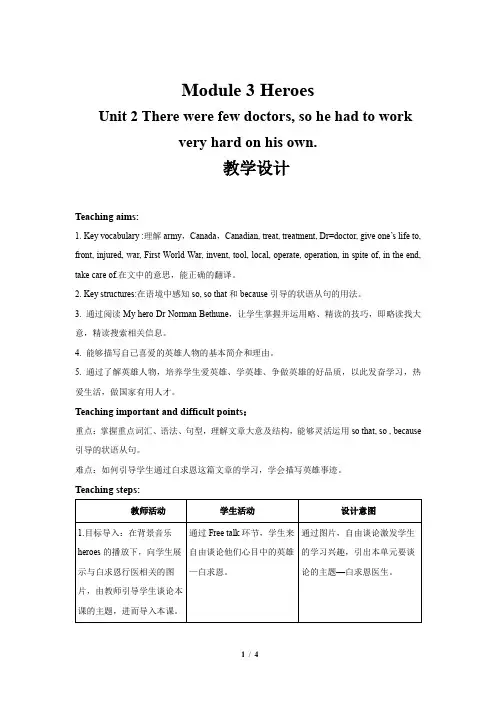
Module 3 Heroes
Unit 2 There were few doctors, so he had to work
very hard on his own.
教学设计
Teaching aims:
1. Key vocabulary :理解army,Canada,Canadian, treat, treatment, Dr=doctor, give one’s life to, front, injured, war, First World War, invent, tool, local, operate, operation, in spite of, in the end, take care of.在文中的意思,能正确的翻译。
2. Key structures:在语境中感知so, so that和because引导的状语从句的用法。
3. 通过阅读My hero Dr Norman Bethune,让学生掌握并运用略、精读的技巧,即略读找大意,精读搜索相关信息。
4. 能够描写自己喜爱的英雄人物的基本简介和理由。
5. 通过了解英雄人物,培养学生爱英雄、学英雄、争做英雄的好品质,以此发奋学习,热爱生活,做国家有用人才。
Teaching important and difficult points:
重点:掌握重点词汇、语法、句型,理解文章大意及结构,能够灵活运用so that, so , because 引导的状语从句。
难点:如何引导学生通过白求恩这篇文章的学习,学会描写英雄事迹。
Teaching steps:。
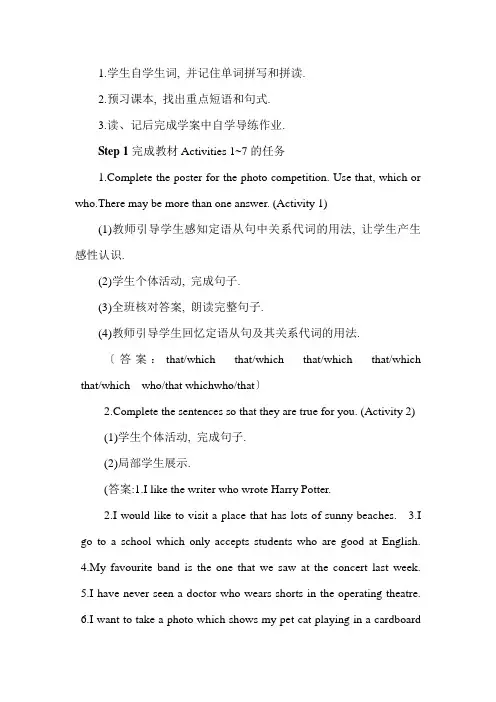
1.学生自学生词, 并记住单词拼写和拼读.2.预习课本, 找出重点短语和句式.3.读、记后完成学案中自学导练作业.Step 1完成教材Activities 1~7的任务plete the poster for the photo competition. Use that, which or who.There may be more than one answer. (Activity 1)(1)教师引导学生感知定语从句中关系代词的用法, 让学生产生感性认识.(2)学生个体活动, 完成句子.(3)全班核对答案, 朗读完整句子.(4)教师引导学生回忆定语从句及其关系代词的用法.〔答案:that/which that/which that/which that/which that/which who/that whichwho/that〕plete the sentences so that they are true for you. (Activity 2)(1)学生个体活动, 完成句子.(2)局部学生展示.(答案:1.I like the writer who wrote Harry Potter.2.I would like to visit a place that has lots of sunny beaches.3.I go to a school which only accepts students who are good at English.4.My favourite band is the one that we saw at the concert last week.5.I have never seen a doctor who wears shorts in the operating theatre.6.I want to take a photo which shows my pet cat playing in a cardboardbox. 7.Our teacher is the man who is wearing a purple shirt.)3.Work in pairs. Talk about the two photos. Then talk about the people in the photos. Now ask questions about the photos and write down your answers. 〔Activity 3〕(1)教师鼓励学生发挥想象力, 合理运用定语从句描述照片, 表达自己的观点.(2)全班以小组的形式展开对照片的描述.4.Work in pairs. Look around the class and describe someone or something to your partner. Can your partner guess who or what you are describing? 〔Activity 4〕同伴活动或小组活动, 描述并猜测.plete the conversation with the expressions in the box. 〔Activity 5〕(1)全班朗读对话, 预测各空白处应该填入的短语.(2)学生个体活动, 完成对话. 全班核对答案.6.Read the passage and complete the table. 〔Activity 6〕教师可以让学生在规定的时间内找到表格中问题的答案, 锻炼学生快速获取信息的能力.7.Listen and complete the sentences. (Activity 7)(1)浏览句子, 听录音.(2)两人一组核对答案, 并复述所听短文的主要内容.Step 2小结训练1.每天我花很多时间做日常工作.It takes me a long time to do daily work every day.2.顺便问一下, 如果我试一下这电脑你介意吗?By the way ,Do you mind if I try the computer out?Step 3Around the world教师可以组织学生收集一些照片、摄影作品, 介绍与其相关的故事, 欣赏不同国家不同历史时期的照片.Step 4完成教材Activities 8~10的任务课前, 教师要求学生准备几张自己喜欢的照片. 学生了解有照顾片的情况, 对其进行描述.Step 5家庭作业完成学案中的相关练习.本节课活动的目的是以练习及活动的方式复习本模块的语言及语法知识. 学生掌握较好但定语从句的灵活运用能力欠缺, 在下课后加大练习. 1.学生自学生词, 并记住单词拼写和拼读.2.预习课本, 找出重点短语和句式.3.读、记后完成学案中自学导练作业.Step 1情景导入T:Who do you think is more well- known as a writer, Shakespeare or Confucius?S1:I think Shakespeare is more- known. Confucius was more a thinker than a writer.S2:I think Confucius is as well-known as Shakespeare.Step 2完成教材Activity 4的任务Complete the passage with the correct form of the words in the box. (Activity 4)〔1〕学生个体活动, 完成填空.〔2〕两人一组核对答案, 检査单词拼写.(答案:1.discussing 2.review 3.accepts 4.thinker 5.wise6.influenced7.sense)〔3〕全班核对答案, 集体朗读短文.环节说明:本活动旨在考査学生对所学词汇的掌握情况. 对于这些词汇, 学生应该到达准确朗读、理解并熟练运用的程度.Step 3小结训练1.That book influenced him much, Because he became more polite after reading it.2.It is well-known to people all over/around the world 〔全世界〕.3.The words of our English teacher makes sense(有意义/合情理〕to all of us.4.By the way (顺便提一下), you will be late for your plane if you don’t go now.5.I suppose that he’ll come back tomorrow.Step 4完成教材Activities 5,6的任务1.Listen and underline the words the speaker stresses. Now listen again and repeat. (Activity 5)(1)学生个体活动, 听录音, 给重读单词加下划线.(2)再次听录音, 跟读并检査答案.(3)教师点名, 局部学生朗读句子, 全班反响.2.Work in groups. Do you agree with the following opinions?Give your reasons. Now report the ideas of your group to the whole class. (Activity 6)(1)学生个体活动, 阅读活动所给的三个观点, 组织语言表达自己的看法.(2)小组讨论, 组内选出一名学生归纳并记录本小组的意见.(3)每组推举一名学生向全班同学汇报.Step 5问题探究〔B〕1.In the art show, a lot of enjoyment _________.A.is givingB.is givenC. will giveD. has given〔B〕2.Fan Bingbing is __________ an actress.A.known ofB.known asC.known toD.famous for(C)3.How many hours ________to fly to New York from Paris?A.do you spendB. does it costC. does it takeD.do you take(D)4.Britain English is_______ American English. people are learning American English.A. same to; Million ofB. similar to; 5 millionsC. same as; 5 millionsD. similar to; Millions ofStep 6 家庭作业完成学案中的相关练习.本节课活动的目的是让学生初步接触被动语态, 同时掌握本单元的词汇、短语及重点句子, 进一步加强学生的听力训练, 被动语态还需在后一单元进一步稳固.。
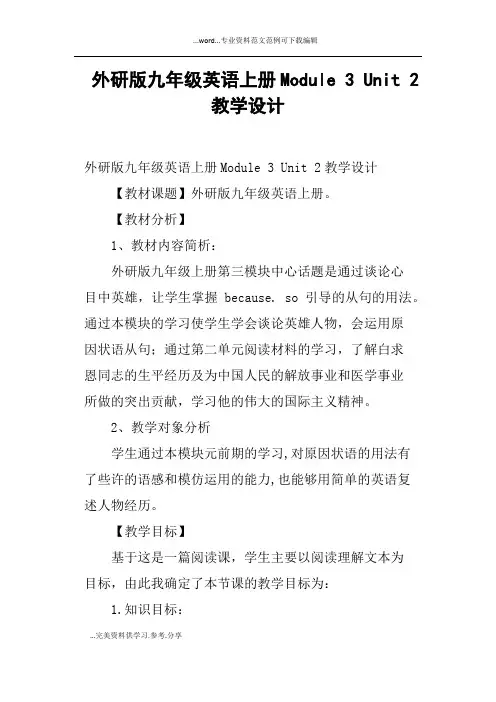
外研版九年级英语上册Module 3 Unit 2教学设计外研版九年级英语上册Module 3 Unit 2教学设计【教材课题】外研版九年级英语上册。
【教材分析】1、教材内容简析:外研版九年级上册第三模块中心话题是通过谈论心目中英雄,让学生掌握because. so 引导的从句的用法。
通过本模块的学习使学生学会谈论英雄人物,会运用原因状语从句;通过第二单元阅读材料的学习,了解白求恩同志的生平经历及为中国人民的解放事业和医学事业所做的突出贡献,学习他的伟大的国际主义精神。
2、教学对象分析学生通过本模块元前期的学习,对原因状语的用法有了些许的语感和模仿运用的能力,也能够用简单的英语复述人物经历。
【教学目标】基于这是一篇阅读课,学生主要以阅读理解文本为目标,由此我确定了本节课的教学目标为:1.知识目标:●80%的学生能够基本了解本节课的单词和词组。
了解本节课的单词有:Canadialdat, war, wound, realise,dying .tool, invusefulanage. operaue,Canada等。
词组有:ddake care of, at thas own等。
2.能力目标:●学生能够通过略读、细读的方法阅读课文,能捕捉全文和段落大意,其错误率不超过30%。
●学生在阅读课文的过程中,能够排除不重要生词、推测关键词义,理解篇章,理解程度达70%。
●学生在阅读过程中形成正确的阅读策略,提高英语学习的积极性。
3.情感目标:●通过课堂学习活动,鼓励学生积极参与课堂活动,克服羞怯心理,加强与伙伴的合作,不怕出错,乐于纠错。
●激发其对英语的兴趣和喜爱,培养其学英语的积极性和自信心。
4.德育目标:●了解白求恩同志的生平经历,学习他的献身革命工作和爱国主义精神。
【教学重点】1.扫读技巧在阅读中的运用。
2.阅读过程中采用做笔记和划线找出文中的关键信息,并能总结出文章核心内容。
【教学难点】1、阅读过程中采用做笔记和划线找出文中的关键信息,并能总结出文章核心内容。
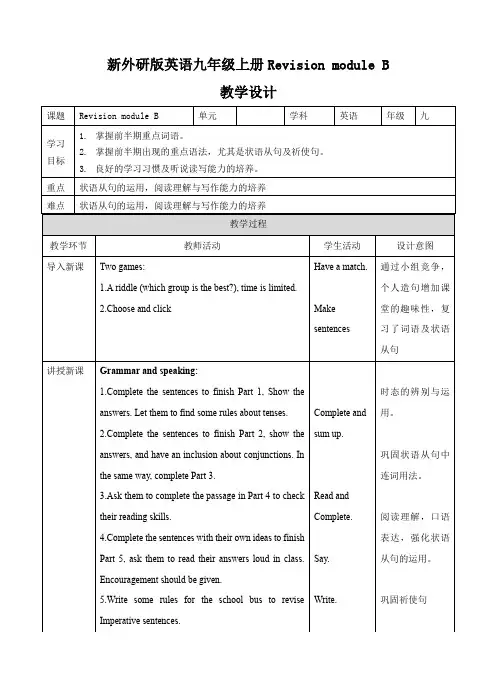
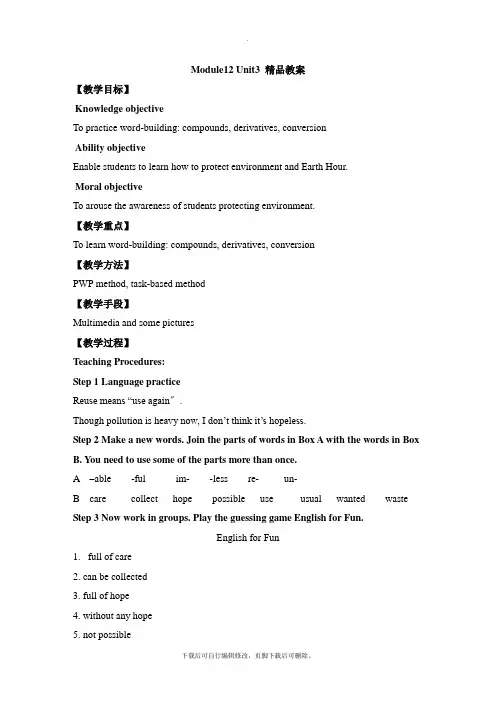
Module12 Unit3 精品教案【教学目标】Knowledge objectiveTo practice word-building: compounds, derivatives, conversionAbility objectiveEnable students to learn how to protect environment and Earth Hour.Moral objectiveTo arouse the awareness of students protecting environment.【教学重点】To learn word-building: compounds, derivatives, conversion【教学方法】PWP method, task-based method【教学手段】Multimedia and some pictures【教学过程】Teaching Procedures:Step 1 Language practiceReuse means “use again〞.Though pollution is he avy now, I don’t think it’s hopeless.Step 2 Make a new words. Join the parts of words in Box A with the words in Box B. You need to use some of the parts more than once.A –able -ful im- -less re- un-B care collect hope possible use usual wanted waste Step 3 Now work in groups. Play the guessing game English for Fun.English for Fun1.full of care ____________2. can be collected ____________3. full of hope ____________4. without any hope ____________5. not possible ____________6. not usual ____________7. without any use ____________8. use again ____________9. not wanted ____________10. making a lot of waste ____________Step 4Learning to learnSometimes if you know the meaning of the parts of a word, you can work out the meaning of the whole word.re + new + able;re = again,able = can berenewable = can be new againStep 5构词法1. 合成法将两个或两个以上独立且语义不同的单词合在一起构成新词的方法叫做合成法。
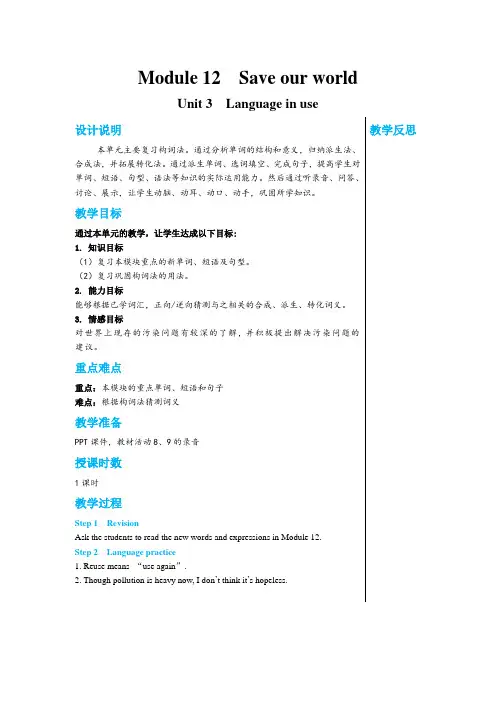
Module 12 Save our worldUnit 3 Language in use教学反思设计说明本单元主要复习构词法。
通过分析单词的结构和意义,归纳派生法、合成法,并拓展转化法。
通过派生单词、选词填空、完成句子,提高学生对单词、短语、句型、语法等知识的实际运用能力。
然后通过听录音、问答、讨论、展示,让学生动脑、动耳、动口、动手,巩固所学知识。
教学目标通过本单元的教学,让学生达成以下目标:1. 知识目标(1)复习本模块重点的新单词、短语及句型。
(2)复习巩固构词法的用法。
2. 能力目标能够根据已学词汇,正向/逆向猜测与之相关的合成、派生、转化词义。
3. 情感目标对世界上现存的污染问题有较深的了解,并积极提出解决污染问题的建议。
重点难点重点:本模块的重点单词、短语和句子难点:根据构词法猜测词义教学准备PPT课件,教材活动8、9的录音授课时数1课时教学过程Step 1 RevisionAsk the students to read the new words and expressions in Module 12.Step 2 Language practice1. Reuse means “use again”.2. Though pollution is heavy now, I don’t think it’s hopeless.Step 3 Grammar构词法1. 合成法将两个或两个以上独立且语意不同的单词合在一起构成新词的方法称作合成法。
2. 派生法通过在词根前面加前缀或在词根后面加后缀构成新词的方法称作派生法。
3. 转化法英语构词法中把一种词性转换为另一种词性而词形不变的方法称为转化法。
(1)动词转化为名词talk v.谈论n.谈话(2)名词转化为动词water n.水v.浇水(3)形容词转化为名词light adj.明亮的n.光线Step 4 Practice1. Make new words. Join the parts of the words in Box A with the words inBox B. You need to use some of the parts more than once.Put students in pairs to make as many new words as possible. Answers :careful careless collectable recollect hopeful hopeless impossible reuse usable useful useless unusualunwanted wastefulNow work in groups. Play the guessing game English for Fun.(1)Put students in groups of four.(2)Tell students theyare going to play a guessing game. Groups have to match words from the first step in Activity 1 to the definitions. The first group to finish should put their hands up or shout “Guessed it!”All groups should then stop writing.(3)Check the answers as a class.2. Complete the sentences with the words in the box.(1)Ask students to read the sentences and check the meaning.(2)Tell students to complete the sentences using thewords in the box, and then compare answers with theirdesk partner.hopeful impossible reuse unhealthy wasteful1 Polluted water is _________.2 It is _________ to throw so much food away.3 If you look after things well, you may _________ some of them later.4 It is _________ to clean up the whole river in such a short time.5 If we pay attention to pollution now, the future will be _________.Answers :1 unhealthy 2 wasteful 3 reuse 4 impossible5 hopefulB care collect hope possible use usual wanted waste A -able -ful im- -less re- un-3. Complete the table.(1)Put students in pairs to complete the table.(2)Check the answers as a class.4. Complete the sentences with the correct form of the words in Activity 3. Ask students to read and complete the sentences with words from the table.She was hopeful that her new job would make her more successful.1 The factory ________ the river, and the fish died.2 We often walk in the countryside. It is a(n)_______ activity for us.3 Do not use so much water. It is very ________.4 To keep the flowers growing, you need to _______ them once a day. Answers:1 polluted 2 usual 3 wasteful 4 water5. Complete the sentences.(1)Ask students to read the example sentence andtell you which two words the answer is made up of(lunch+box). Point out that this is a very commonmethod of making words in English.(2)Ask students to complete the remaining sentences.A lunchbox is a box that you keep your lunch in.1 A __________ is a card that you write on one side of and send to someone by post.2 A __________ is a room where you have classes at school.3 A __________ is a book that has one or more stories for children.4 A __________ is a black board that is used at school for writing on with chalk. Answers:1 postcard 2 classroom 3 storybook 4 blackboardStep 5 SpeakingWork in pairs. Look at the pictures and answer the questions.1 What kind of things can be recycled?2 How can these things be reused?3 How does this help the environment?4 Have you ever recycled or used things that can be recycled? How?Answers(Just for reference):1 Cloth, paper, cans, plastic, glass, etc.2 Recycled paper can be used for notebooks, tickets or writing paper.3 It helps save a lot of resources and reduce greenhouse gas emissions.4 Yes. I recycled aluminum cans and paper by selling them to the recycled factory.Step 6 ExerciseComplete the conversation with the correct form of the expressions in the’t you (1)_____________ the pollution that such long plane journeys may cause for the environment?Ken: I know, but what can I do about it? I’ve already tried my best to protect the environment. I recycle. I don’t (2)__________ things if I don’t want them any more. I (3)__________ the lights when I leave a room. Don’t tell meI shouldn’t travel by plane any more!Mike: No, of course not. But we can do more to protect the environment.For example, we can help keep the air clean by planting trees. Trees (4)________ the environment. In this way, we can reduce the harm of pollution.Ken: Good! So I can enjoy my holiday, and when I come back, I’ll plant some trees!Mike: That’s the idea! Maybe we can all join in and start a small forest! Answers:(1)worried about (2)throw away (3)turn off(4)are good forStep 7 Listening1. Listen and check(√)the true sentences.(1)Tell students they are going to listen to a passage about how to reduce, reuse and recycle.(2)Let students read through the sentences first. Ask them to predict which sentences are likely to be true in the listening passage.(3)Play the recording for students and check the correct sentences.1 It is OK to throw used things away. Looking after them takes a lot of time.2 Do not throw away things made of glass, plastic and paper, but recycle them when possible.3 Take a bag when you go shopping.4 Producing electricity and using oil will not cause pollution.5 Turn off lights when you do not need them.6 Ride a bike or walk, and do not often drive your car.Answers:2 √ 3 √ 5 √ 6 √2. Listen again and complete the table.(1)Ask students to read the table and try to completeit from memory.(2)Tell students to compare their answers with a partner, and then play therecording again for them to check their answers.(3)Play the conversation a final time, if necessary.Step 8 Around the world(1)Ask students to look at the photo and the title of the passage and guess what Earth Hour is.(2)Tell students to read the passage very quickly to see if their ideas are correct.(3)Read the passage as a class.be held switch off awareness of climate change more and more take part in Step 9 Module task: discussing what you can do about pollution1. Work in pairs. Decide what kind of pollution you want to talk about. Choose a subject that you care about the most. It could be water pollution, air pollution, etc.Find out more information about your subject. Look it up on a website or in a book.(1)Put students in small groups and ask them to list different kinds of pollution.(2)Ask students to decide upon the kind of pollution their group would like to talk about.(3)Give students time to research the topic.2. Discuss your subject.(1)Tell each group to nominate a secretary who willlisten to their discussion and take notes.(2)Tell students to follow the instructions anddiscuss their topic.(3)When the discussion is finished, the groupsecretary reads the notes to the group, who decide ifit is a reliable summary.(4)The group then uses the secretary’s notes topr epare a short presentation on the type of pollutionthey have chosen.3. Present some groups ’ ideas to the whole class.Step 10 Homework举行关掉;关上气候改变的意识越来越多参加(活动)Review the words, expressions and grammar in this module.当堂达标Ⅰ. 用所给单词的适当形式填空。
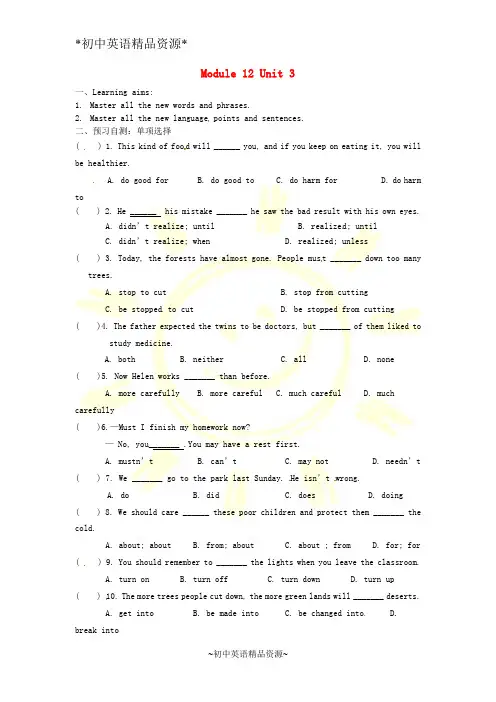
Module 12 Unit 3一、Learning aims:1.Master all the new words and phrases.2.Master all the new language points and sentences.二、预习自测:单项选择( ) 1. This kind of foo d will ______ you, and if you keep on eating it, you will be healthier.A. do good forB. do good toC. do harm forD. do harm to( ) 2. He ______ his mistake _______ he saw the bad result with his own eyes.A. didn’t realize; untilB. realized; untilC. didn’t realize; whenD. realized; unless( ) 3. Today, the forests have almost gone. People mus t _______ down too many trees.A. stop to cutB. stop from cuttingC. be stopped to cutD. be stopped from cutting( )4. The father expected the twins to be doctors, but _______ of them liked to study medicine.A. bothB. neitherC. allD. none( )5. Now Helen works _______ than before.A. more carefullyB. more carefulC. much carefulD. much carefully( )6.—Must I finish my homework now?— No, you_______ .You may have a rest first.A. mustn’tB. can’tC. may notD. needn’t ( ) 7. We _______ go to the park last Sunday. He isn’t wrong.A. doB. didC. doesD. doing( ) 8. We should care ______ these poor children and protect them _______ the cold.A. about; aboutB. from; aboutC. about ; fromD. for; for ( ) 9. You should remember to _______ the lights when you leave the classroom.A. turn onB. turn offC. turn downD. turn up( ) 10. The more trees people cut down, the more green lands will _______ deserts.A. get intoB. be made intoC. be changed intoD.break into~初中英语精品资源~Ⅱ. 用所给词的适当形式填空1. Although it takes energy________ (change) something into something else, it’sbetter than _______ (throw) things away.2. It may cause cancer if we drink_______ (pollute) water.3. It’s dark, but my father hasn’t come back, s o my mother is ________ (worry)about him.4. I find it difficult _______ (work) out the math problem.三:当堂达标.完形填空As we all know, the environment around us is getting worse and worse. In some places we can’t see fish __1 in the river or trees on the hills. Some peopleeven have no clean water to drink.Recently, a new lifestyle called low carbon life is 2 every corner of our country. The meaning of low carbon is 3 _ energy and no waste. It is such animportant project that I can’t wait 4 my ideas on how to promote it.First,we should 5 a no-car day every week in our school. Because cars not only cause serious air pollution but also waste energy. _6 the no-car day,neither students _ 7 teachers are allowed to drive to school. At the same time,just walk or run. Use our 8 and enjoy the fun.Second, we had better not use plastic bags 9 . No one can stand the “white pollution”, _10 it is wise to use cloth bags which can 11 again and again.__12 ,one thing _13 we should keep in mind is that every big thing comes from the small details. So, as students, we ought to turn 14 the lights themome nt we leave, use __15 sides of the paper, and reuse our textbooks and so on.All in all, it weighs greatly for all of us to put the low carbon lifestyle into practice. Just set our mind to these:no-car days, no plastic bags, and no waste.Let’s do it now.( ) 1. A. swims B. swimming C. to swim D. swam( ) 2. A. spreading B. moving C. living D. becoming( ) 3. A. below B. high C. above D. low( ) 4. A. to express B. express C. expressing D. expressed( ) 5. A. set off B. set up C. put on D. put down( ) 6. A. In B. At C. On D. With( ) 7. A. nor B. or C. both D. and~初中英语精品资源~]( ) 8. A. bikes B. cars C. buses D. legs( ) 9. A. any more B. no more C. no longer D. never ( ) 10. A. because B. so C. but D. although ( ) 11. A. reused B. be used C. is used D. use ( ) 12. A. Finally B. Final C. Last D. Lately( ) 13. A. who B. what C. that D. whose( ) 14. A. up B. down C. on D. off( ) 15. A. both B. each C. every D. all~初中英语精品资源~。
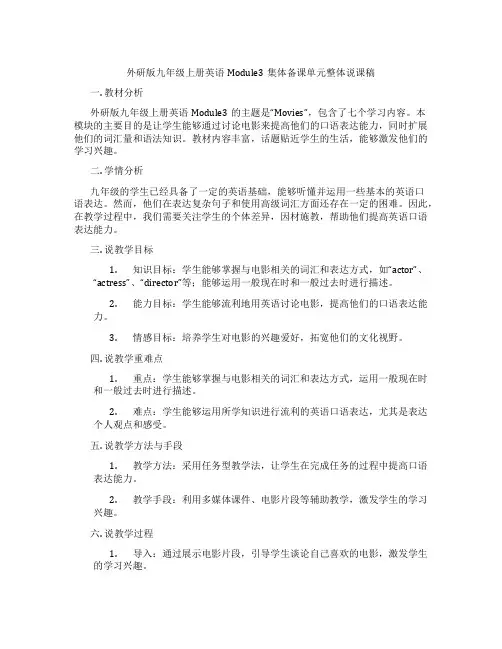
外研版九年级上册英语Module3集体备课单元整体说课稿一. 教材分析外研版九年级上册英语Module3的主题是“Movies”,包含了七个学习内容。
本模块的主要目的是让学生能够通过讨论电影来提高他们的口语表达能力,同时扩展他们的词汇量和语法知识。
教材内容丰富,话题贴近学生的生活,能够激发他们的学习兴趣。
二. 学情分析九年级的学生已经具备了一定的英语基础,能够听懂并运用一些基本的英语口语表达。
然而,他们在表达复杂句子和使用高级词汇方面还存在一定的困难。
因此,在教学过程中,我们需要关注学生的个体差异,因材施教,帮助他们提高英语口语表达能力。
三. 说教学目标1.知识目标:学生能够掌握与电影相关的词汇和表达方式,如“actor”、“actress”、“director”等;能够运用一般现在时和一般过去时进行描述。
2.能力目标:学生能够流利地用英语讨论电影,提高他们的口语表达能力。
3.情感目标:培养学生对电影的兴趣爱好,拓宽他们的文化视野。
四. 说教学重难点1.重点:学生能够掌握与电影相关的词汇和表达方式,运用一般现在时和一般过去时进行描述。
2.难点:学生能够运用所学知识进行流利的英语口语表达,尤其是表达个人观点和感受。
五. 说教学方法与手段1.教学方法:采用任务型教学法,让学生在完成任务的过程中提高口语表达能力。
2.教学手段:利用多媒体课件、电影片段等辅助教学,激发学生的学习兴趣。
六. 说教学过程1.导入:通过展示电影片段,引导学生谈论自己喜欢的电影,激发学生的学习兴趣。
2.新课呈现:介绍电影相关的词汇和表达方式,如“actor”、“actress”、“director”等,并进行举例说明。
3.语法讲解:讲解一般现在时和一般过去时的用法,让学生通过练习巩固所学知识。
4.小组讨论:让学生分组讨论自己喜欢的电影,并用英语进行表达。
5.展示环节:各小组代表进行口头陈述,其他学生进行评价和补充。
6.课堂总结:对本节课所学内容进行总结,强调重点词汇和表达方式。
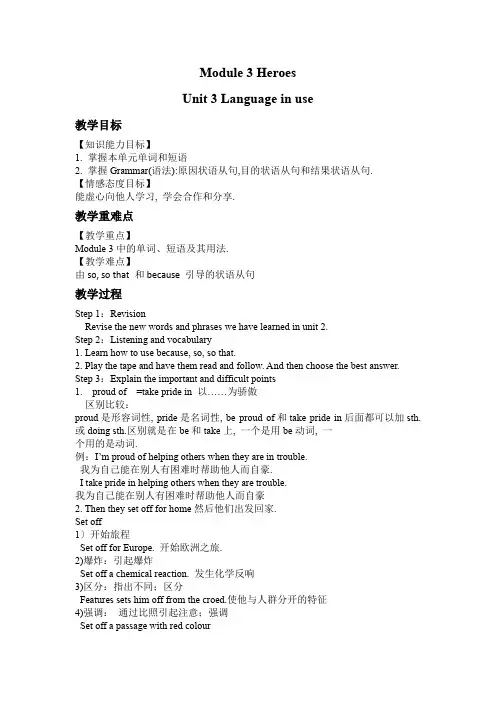
Module 3 HeroesUnit 3 Language in use教学目标【知识能力目标】1. 掌握本单元单词和短语2. 掌握Grammar(语法):原因状语从句,目的状语从句和结果状语从句.【情感态度目标】能虚心向他人学习, 学会合作和分享.教学重难点【教学重点】Module 3中的单词、短语及其用法.【教学难点】由so, so that 和because 引导的状语从句教学过程Step 1:RevisionRevise the new words and phrases we have learned in unit 2.Step 2:Listening and vocabulary1. Learn how to use because, so, so that.2. Play the tape and have them read and follow. And then choose the best answer. Step 3:Explain the important and difficult points1.proud of =take pride in 以……为骄傲区别比较:proud是形容词性, pride是名词性, be proud of和take pride in后面都可以加sth. 或doing sth.区别就是在be和take上, 一个是用be动词, 一个用的是动词.例:I’m proud of helping others when they are in trouble.我为自己能在别人有困难时帮助他人而自豪.I take pride in helping others when they are trouble.我为自己能在别人有困难时帮助他人而自豪2. Then they set off for home然后他们出发回家.Set off1〕开始旅程Set off for Europe. 开始欧洲之旅.2)爆炸:引起爆炸Set off a chemical reaction. 发生化学反响3)区分:指出不同;区分Features sets him off from the croed.使他与人群分开的特征4)强调:通过比照引起注意;强调Set off a passage with red colour用红色强调一段.常用词组(1) set about 开始:开始或出发set about doing sth.开始着手做某事.Set about solving the problem. 着手解决(2) set out 着手:开始一个热切的方案;set out to do sth. 开始着手做某事He set out to understand why the plan had failed. 他开始明白为什么方案失败了.(3) set apart1)留出, 拨出:留出以备专用You must set apart some money for the future. 你必须留出一些钱来以备将来之用.2)使引人注目〔set apart from 从……中别离出来〕Her high height sets her apart from her sisters.高高的个子使她在其姊妹中分外引人注目.(4). set down1). 坐:使坐;坐下Set the baby down here. 让小孩坐这儿.2). 记录:写下;记录We set down the facts. 我们记下事实.3). 把……归于:由……引起;Let‘s set the error down to inexperience. 让我们把错误归于没有经验.4). 着陆:〔飞机〕着陆The plane set down on the airport.飞机在机场着陆.(5). set up1)直立:放于竖直位置He set up the statue in the square.他把雕像竖立在广场里2)组装:集合并装配Set up a new machine. 组装一台新机器3). 建立Set up a charity. 建立一家慈善机构3. ten more years on the way homeon one‘s way to+地点, 在某人去某地的路上. 地点是home, there等地点副词时, 省略toI met my old friend on my way to park.我在去公园的路上遇到了一位老朋友.I can't enter my house because I've lost my key on my way home.我进不了自己的房子, 因为在回家的路上我把钥匙丢了.4. the only one who recognizes him is his old dog.recognize vt.1)识别出某人[某事物];My classmate doesn’t recognize me because I cut my hair yesterday.我同学没有认出我, 因为我昨天把头发剪了.2) 成认…有效(属实); 认可;Recognize a new government成认新政府3) 成认[认清]〔某事物);I recognize no such thing.我不成认任何这类事情.5. but he manages to get away. 但是他成功逃脱了get away 离开, 脱身; 逃掉; 抽身; 拔身;1) 走开, 离开:例句: She didn’t get away until nine last night.昨晚九点她才离开.2). 逃走, 跑掉;逃离犯罪现场:例句: I caught three mice, but one got away.我逮住了三只耗子, 但有一只逃脱了.3). 休假:例句: I couldn’t get away at all last year, I was too busy.去年我根本不能休假, 我太忙了6. I also learn from him that great men never give up, no matter what difficulties they face.no matter与疑问词who, what, where, when, how, if, whether等连用, 意为“无论, 不管〞. 如:1)Don‘t open the door, no matter who comes. 不管谁来都别开门2) Don‘t trust him, no matter what he says. 无论他说什么, 都别相信他.3) No matter where you work, you can always find time to study.无论你在哪里工作, 你都能找到时间学习.Step 4:Grammar box: 状语从句总结1.时间状语从句由as, after, as soon as, before, since, until , when ,whenever, while 等连词来引导As he explored the sea, he took a lot of pictures. 他探海的时候拍了很多照片.As soon as he arrived in France, he called me. 他一到达法国就给我打了.He has been in Shanghai since he was born. 自他出生以来他就一直在上海. Don’t come in until you are called. 除非你被叫到, 否那么不要进来. Whenever we’re in trouble, he’ll help us. 无论何时只要我们有困难, 他都会帮助我们.While I was watching TV, the bell rang. 我正在看电视的时候, 门铃响了.2. 原因状语从句常用引导词:because, since, asI didn’t go surfing, because it was too cold.我没有去冲浪, 因为太冷了.As the car is expensive, we can’t buy it.因为车太贵了所以没有买.Since he was busy, he didn’t come. 他太忙了所以没有来.3. 目的状语从句常用引导词:so, so that, in order thatWe’ll sit near the front so we can hear the speaker better.我们坐在前面, 这样可以更好地听演讲.He sat in the dark so that he couldn’t be seen. 坐在暗处, 这样的话不容易被发现.4. 结果状语从句常用引导词:so, so… that, such … that,He was so weak that he couldn’t walk on.他如此虚弱所以不能走路.He got up so early that he caught the first bus.他起的如此早, 这样他就能赶上头班车了.It’s such a good chance that we must not miss it. 这是一个很好的时机我们不能错过了.5. 比较状语从句常用引导词:as (so)…as , than 等引导She is not so (as) bad-tempered as her mother. 她脾气不像她母亲那样暴躁.The house is three times as big as ours. 这房子比我们的大三倍.6. 条件状语从句常用引导词:if, unlessWe’ll start our project if the president agrees. 如果总统同意, 我们就会开始我们的工程.If you travel in India, you can use English everywhere.如果你去印度旅游, 再任何地方你都可以使用英语.I won’t pass the exam unless I work hard. 除非我努力学习, 否那么不会通过考试. Step 4 Exercises on the book.Do the exercises on the book, and check the answers together.课堂作业一、根据句意及首字母或汉语提示写单词.1. John joined the a______ two years ago. That is to say, he has been a soldier for two years.2. People all over the world call for peace, but hate w______.3. A dictionary is a very good t______ when we learn English.4. The writer decides to r_______ the story because some boys don’t like it.5. The doctor decided to give the boy complete t________.6. Ling ling wants to do m __________ research when she grows up.7. This morning some foreigners came to visit our school. They are all C__________.8. Edison tried thousands of times, and finally he i__________ the bulb.9. Luckily, the o________ on the old lady was quite successful.10. Bell was one of the greatest________(创造家). He invented the phone.11. He is a person _______ (没有) many words二、单项选择( ) 1.What he said made our teacher ________.A. angryB. angrilyC. sadlyD. happily( ) 2. In 1938, Dr. Bethune came to China ________ the Chinese soldiers.A. treatedB. treatingC. to treatD. to treated( )3. The famous nurse was born ________ May 12th ,1820 and died ______ August, 1910.A. in ;onB. on; inC. on; onD. in; in( ) 4. If you have questions, you should ask the teacher ________ information.A. byB. atC. forD. to( ) 5. I can’t pronounce the word. Let’s ________ in a dictionary.A. look up itB. to look it upC. to look up itD. look it up( ) 6. ________ little food isn’t enough for ________ many people.A. Such ;soB. So ;suchC. Such; suchD. So ;so( ) 7. There’re books in our school library.A. thousandsB. thousand ofC. two thousandD. two thousands of( ) 8. Can you make the girl ________ crying?A. to stopB. stoppedC. stoppingD. stop( ) 9. His parents asked him ________ play computer games for a long time.A. notB. to notC. don’tD. not to( ) 10. It’s kind ________ you to help me.A. forB. withC. ofD. about三、根据所给的汉语句子补充完整〔每空一词〕1. 老师要求他重写作文.The teacher ________ him to ________ the composition.2. 雷锋是我国最知名的英雄.Lei Feng was one of the most _______ _______ in China.3. 他一直在照顾那位受伤的战士.He kept looking after the _______ _______.4. 医生立即为老人实施了手术.The doctor _______ an _______ on the old man at once.5. 他们正在报纸上查阅信息.They were _______ _______ the information in the newspapers.6.些学生在公园里玩得很开心.The students ________ ________ in the park yesterday.练习题答案:一、根据句意及首字母或汉语提示写单词.1. army2. rewrite3. tool4. rewrite5. treatment6. medical7. Canadians 8. invented 9. operation 10. inventors 11. without二、单项选择1-5 ACBCD 6-10 ACDDC三、根据所给的汉语句子补充完整〔每空一词〕1. asked, rewrite2. famous heroes3. wounded soldiers4. performed operation5. looking up6. enjoyed themselves教学反思Unit 3 Language in use教学目标【知识目标】1、正确运用本模块的词汇及短语:stand for, point, decision, excuse, seat, no way, fair, kick, be mad at, ability, race, pride.等.2、能够掌握一般过去时被动语态的概念和用法.【能力目标】能根据本模块所学的知识, 调查同学参与体育活动的情况并以书面形式进行总结汇报.【情感态度目标】1、能听懂关于体育运动的对话并获取相关的细节信息.2、通过学习, 加深对残奥会的了解.教学重难点【教学重点】能够掌握一般过去时被动语态的概念和用法.【教学难点】能根据本模块所学的知识, 调查同学参与体育活动的情况并以书面形式进行总结汇报.教学过程Step 1. Leading-in1. Show students a short video about Olympic Games and Paralympic Games.The students watch the video and learn something about the two games.Step 2. While-task1. Let the students work in pairs read the two sentences and summarize the structure of the Past Simple Passive.Read the two sentences and summarize the structure of the Past Simple Passive in pairs.主语+was\were+done+其它句子成分.2. Do some exercises.Work in groups of four, finish Activity1, 2, 5.3. Call back the answers.4. Do some listening.(1) Have students listen and check the true sentences(Activity6) , listen and choose the correct answer(Activity7).(2) Call back the answers.5. Do some reading.(1) Have the students work in pairs and put the sentences in the correct order to makea conversation. (Activity8).(2) Call back the answers.(3) Have the students read the conversation in pairs.6. Around the world.Have the students read The Paralympic Games and try to know something about it. Read The Paralympic Games and try to know something about it.让学生了解残奥会, 教育学生尊重、关心弱势群体, 并尽力去帮助他们.Step 3 Summary1. 被动语态2. 常用短语: stand for no way set up suffer fromfirst place stop sb. from sth. take pride in让学生了解被动语态的用法和这些常用短语的意思及用法.Step 4 Exercises通过一些练习来稳固学生所学的知识.1. Each year quite a lot of food ____ around the world. It’s really time for us to do something.A. was wastedB. is wastedC. will be wasted2. He___ to study harder for the coming exam yesterday.A. encourageB. is encouragedC. was encouraged3. Many children in Britain ___ to have their own bank cards last year.A. allowedB. are allowedC. were allowed4. Tom ____ three chances in the high jump then.A. giveB. am givenC. was givenD. will be givenKeys: 1. B 2. C 3. C 4. C中考链接1. Many buildings in Lushan ______ in the earthquake on April 20th. It will surely be reconstructed(重建) more beautifully.A. have destroyedB. are destroyedC. were destroyedD. are destroying2. -You bought a new car! An American car?-No. A Chinese car. It ______ in Taizhou.A. makesB. madeC. was madeD. will be made3. -Why did Tom go to bed so late yesterday?-Because his homework _____on time.A. didn’t finishB. finishC. wasn’t finished4. It was reported that nine Chinese people ______ in a balloon crash (坠毁〕in Egypton February 26, 2021.A. are killedB. were killedC. will killD. have killed5. The mobile phone has influenced people’s life a lot since it _____.A. inventsB. inventedC. is inventedD. was invented6. On June 11th, 2021, Shenzhou-10 carrying three astronauts _____ into space fromthe space center in Jiuquan.A. sent upB. are sent upC. was sent up7. –“Frog〞, Mo Yan’s latest novel, please!-Sorry, it _____ just now. But it will come out again soon.A. sold outB. is sold outC. has sold outD. was sold out8. -Who designed this game?-It ______ by Tom in 1999.A. is designedB. designsC. was designedD. designed9. Annie _____ to the party. She had a wonderful time with us.A. invitesB. is invitedC. was invitedD. has invited Keys: 1. C 2. C 3. C 4. B 5. D 6. C 7. D 8. C 9. C课后作业请写一篇文章来介绍体育运动的好处和害处(Positive and Negative Aspects of Sports).文章要点:a. 体育运动的好处.b. 体育运动可能带来的副作用.c. 我参加体育活动的体会.教学反思。
外研社初中英语重点知识精选掌握知识点,多做练习题,基础知识很重要!外研社版初中英语和你一起共同进步学业有成!Module 3 Heroes Unit 1课题: Module 3 Heroes学案Unit 1 She trained hard, so she became a great player later.(第二课时)【教学目标】知识目标:1. 掌握本单元所出现的重点词汇和重点短语及句型2. 熟练掌握because引导的原因状语从句和so引导的结果状语从句能力目标:能听懂关于心目中英雄邓亚萍的语言材料,能通过相关词汇或图片描述一些心目中的英雄人物,能熟练掌握原因和结果状语从句情感目标:大量阅读名人传记,学英雄事迹、走英雄道路、做英雄传人。
从中懂得做人的道理。
【教学重点】1. 领会并灵活使用下列词汇including, attend, abroad, whatever, amazing2. 掌握重点句型:She’s my hero because she’s one of the best table tennis player in theworld.She trained hard, so she became a great player laterWhatever she does, she never gives up3. 熟练掌握because引导的原因状语从句和so引导的结果状语从句【教学难点】能听懂关于心目中英雄邓亚萍的语言材料,能通过相关词汇或图片描述一些心目中的英雄人物,能熟练掌握原因和结果状语从句【教学方法】PWP method, task-based method【重难点突破】:以介绍为核心,通过小组活动,在听、说、读、写中使单词及句型以不同的形式反复出现,从而强化学习重难点。
【教具】A tape recorder, multimediait.(amaze)2. Chuchu started _________(learn)English at the age of six.3. Last week, Helen _______ in the English speech _______ and won the first prize. (compete)4.At the concert, Lang Lang, a young Chinese pianist, played_______(simple) wonderfully.5.Yao Ming is one of the ____________(famous) basketball players in the world. (七)达标检测:一、根据句意及首字母提示补全单词。
Module 12 Save our worldUnit3Language in use(复习课教案)Ⅰ、Teaching model:Revision and applicationⅡ、Teaching method:Formal and interactive practiceⅢ、Teaching Objectives●Knowledge objective1.To review the key words, phrases, and sentences of M122 To understand the passage on talking about the environment.3. To give advice on environment.●Ability objective1. To summarise and consolidate the ways of giving advice on environment.● 2. To give advice on environment.Thanks for others’ advice on give advice on environment.Ⅳ、Teaching importance and difficulty1.To summarise and consolidate the ways of giving advice .give advice on environment.2. To practise the new vocabulary and expressions.V、Teaching methodPWP method, task-based methodVI、Teaching aidsA tape recorder, multimedia and some picturesⅦ、Teaching ProceduresLearning Aims (学习目标)1.To review the key words, phrases, and sentences of M122.To understand the problems on give advice on environment.3. To give advice on give advice on environment.Step 1:Review the knowledge (知识回顾)1.师友互查1.Review the phrasesthrow away tons of as...as possible divide....into...be harmfulto take steps try one’s best to do it’s no use(doing sth)2.课文原句在现1.Do you divide the waste into things to recycle and things to throw away ?2.We all need a healthy environment,but we produce waste every day,and it is harmful to our environment.e things for as long as possible.4. Pollution is our great enemy,and we have to fight it.5. They use so much oil and cause pollution as well.6. It’s no use talking about things we can’t do.7. That means less waste.(友情提示:先自主完成再互助检查,说明原因)II.教师点评Step 2: Explanation.(题型讲解)I.师友互讲1.Rewrite the sentence with word building.(Activity1)plete th sentences so that they are true for you (Activity2)(师友自主练习,学友讲给师傅听,师傅纠正错误,并说明原因。
11-12学年英语:Module 3 同步教案(外研版九年级上) 一、学习目标: 知识目标:能正确使用Module 3 中的单词和词组; 能力目标:能够谈论自己喜欢的运动队或体育明星; 情感目标:学习运动员不畏艰难、刻苦训练的精神。
二、重点、难点: 重点:1. 应用本模块交际用语,如:What do you reckon?; Don’t let them get to you!等; 2. 掌握表达观点的句式,如I agree/ I don’t agree with…/ I think you are right/ It’s true. / So do I. 难点:1. 辨析win和defeat, compare…with和compare…to的区别; 2. 一般过去时和一般将来时的被动语态。
三、知能提升 (一)重点单词 [单词学习] 1. allow 【用法】v. 允许 allow (doing) sth. 允许(做)某事 allow sb. to do sth. 允许某人做某事 be allowed to do sth. 被允许做某事 【例句】(1) They don’t allow smoking. 不许他们抽烟。 (2) My father won’t allow me to drive a car. 爸爸不允许我开车。 【考查点】allow后跟含不定式的复合宾语结构及其被动形式。 【易错点】易混淆allow sb. to do sth. 与be allowed to do sth. 的使用。 【考题链接】 You ______________________ football in the street. A. allow to play B. aren’t allowed to play C. aren’t allowed playing 答案:B 解题思路:此题考查allow的用法,由于allow后不能直接跟动词不定式,所以先排除A;而“被允许做某事”的表达是“be allowed to do sth.”,所以选B.
2. against 【用法】prep. 与……相对,相反,反对,依靠 be against 反对,不同意 play against 与……对抗 【例句】No one is against the proposal. 没人反对这项提议。 Our football team will play against theirs this afternoon. 今天下午我们的足球队将和他们的足球队进行比赛。 【考查点】词义理解。 【易错点】against的拼写及误将against作动词用。 【考题链接】 Some people were for the idea and others _______________ it. 有些人赞成这个观点,另外一些人则反对。 答案:were against。 解题思路:首先根据题目所给出的信息知道所填内容的意思是“反对”,由于against是介词,作谓语时要与be动词连用,而前面的时态用了一般过去时,所以be动词也要用一般过去时,others是复数,故应填were against.
3. encourage 【用法】v. 鼓励; encourage sb. to do sth. 鼓励某人做某事; be encouraged to do sth. 被鼓励做某事 【例句】(1) Mother always encourages me to study hard. 妈妈总是鼓励我要努力学习。 (2) I am encouraged to try again by the teacher. 老师鼓励我再试一次。 【考查点】encourage后跟含不定式的复合宾语结构及其被动形式。 【易错点】encourage sb. to do sth. 及be encouraged to do sth. 在使用时易混淆。 【考题链接】 英语老师经常鼓励学生大声说英语。 English teacher often _______________________________________English aloud. 答案:encourages the students to speak 解题思路:这道题要我们翻译的是“鼓励学生说”,考查的是encourage sb. to do sth.这个短语的使用,题目所给出的时间是often, 所以填encourages the students to speak。
4. defeat 【用法】v. 打败,击败 【考查点】defeat和win的辨析。 defeat和win的区别: defeat:“打败,击败”,后面的宾语通常是人或队(team),而且defeat一般用在被动句中。如:His team was defeated again. 他的队伍又被打败了。 win:“赢,获胜”,常接的宾语有game, match, race, prize等. 如:We won the football match just now. 我们刚才赢了足球比赛。 【易错点】defeat和win的用法混淆。 【考题链接】 —Did you ___________ the first prize of the league match? —Of course we did. We __________ all the other teams. A. defeat, beat B. win, win C. win, beat 答案:C. 解题思路:解此题要注意所给出的宾语,问句给出的宾语是the first prize,所以先排除A,因为defeat后不能跟prize; 答语给出的宾语是all the other teams,所以排除B,因为win后不能跟team, 而 beat和defeat后都可以跟人或team, 故选C。
[即学即练] ①—I don’t allow ________________ only in my bedroom. —But I don’t allow my family _______________ anywhere. A. smoking, smoking B. to smoke, smoking C. smoking, to smoke ②He __________ me at chess yesterday. A. defeated B. won C. was beaten ③His parents often encourage him ___________ hard. A. work B. working C. to work ④We lost the game, we were d___________ by No. 1 Middle School. ⑤We will play a _____________ a team from Shanghai in next season. ⑥My teacher often e_____________ us to study hard for the future.
(二)重点短语 [短语学习] 1. stand for 【用法】“代表,象征,意味着” 【例句】The letter PRC stands for the People’s Republic of China. 【考查点】词组本意。 【易错点】错用被动语态。 【考题链接】 The Olympic Rings ____________ the five parts of the world. A. are stand for B. are stood for C. stand for 答案:C 解题思路:此题考查stand for的用法,由于stand for没有被动语态,所以排除B;而A的表达是错误的,故选C。
2. first of all 【用法】“首先,第一” 【例句】First of all, I want to thank you all for coming. 【考查点】first of all 与at first 的辨析。 first of all 与at first 的区别: first of all:用于说明事物排列顺序时的“首先,第一”,多用于开场白。 如:First of all, I have good news to tell you . at first 意思是“起初,最初”,没有排列顺序之分。 如:At first I thought he was a good person, but later I found out he was a jerk(混蛋). 【易错点】first of all 与at first的意思混淆不清。 【考题链接】 ________ I was nervous, but soon I started to relax. A. First of all B. At first C. After all 答案:B。 解题思路:此题考查学生对first of all , at first, after all 意思的掌握。句意是说“起初我很紧张,但是我很快就开始放松下来”,这里没有排列顺序的关系,所以排除A;after all的意思是“毕竟,终究”,所以排除C而选B。
3. be mad with sb. 【用法】“对某人很生气” ;be mad about sth. 对某事很生气 【例句】He is mad with me for being late. He is mad about my being late. 【考查点】词组本意。 【易错点】错用介词。 【考题链接】 She is mad _________ me for telling lies. A. with B. about C. to 答案:A。 解题思路:解此题要注意题目所给出的宾语,由于题目给出的宾语是me,指人,所以先排除B,而“对某人很生气”是“be mad with sb”,故选A。